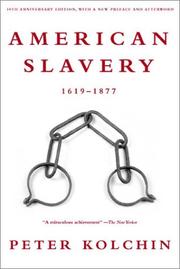I have recently posted on American Slavery: 1619-1877 by Peter Kolchin, but I thought some more about slavery in the United States, especially in the antebellum period.
Life in that period was a lot harder than it is today. A lot of kids died due to communicable diseases that have been largely eliminated today, women died in childbirth much more often than today. People did more physical work, lacking the labor saving devices of today, were much poorer on the average, had fewer alternatives to inform and entertain themselves, and led a more circumscribed life. But the lives of slaves in the American South were probably not that much worse than those of other people. Kolchin points out that on average slave men were an inch taller than recruits to the British marines, implying that they were better nourished as children.
I assume that people in the American South, white and black, went through their days taking things one at a time, in routines, enjoying what they could and suffering what they must, without too much reflection on the other ways that society might better be organized or the ethics of accepting the current social and economic institutions rather than "to take arms against a sea of troubles, and by opposing end them".
"normalizing the unthinkable": "doing terrible things in an organized and systematic way rests on 'normalization.' This is the process whereby ugly, degrading, murderous, and unspeakable acts become routine and are accepted as 'the way things are done.'Southern slave holders did in fact seek to create an extensive justification of the institution of slavery, such as:
Edward S. Herman, quoted in Wikipedia
- The ancient Hebrews had slaves yet slavery was not condemned in the bible, therefore it might be a divinely ordained system.
- Africans were the descendants of Ham and thus condemned to eternal slavery by God.
- Slavery was a means of Christianizing the slaves and thus saving their immortal souls.
- Blacks would only work enough to support the economy and the nation under the discipline of slavery.
- Slave holders were smarter and more civilized than their slaves and through their protection of their slaves improved the conditions of the slaves lives.
- Black slaves in the South were better off than the white "wage slaves" in the North.
This last might be more convincing had not the desperate Irish immigrants to the South often been given jobs that were too dangerous for the slaves, since the economic loss would be less to the employer were the Irish immigrant to die or be crippled than would be the case were it to happen to an economically valuable slave.
Digging through the banality of everyday life and the pseudo-religious or pseudo-philosophical subterfuge and self-delusion there was of course a core of real evil. I am not speaking only of the evil recognized by most southerners of the day of the sadistic slave owner or slave driver, but the evil of the majority living within a system that denied the human dignity of people, that exploited a minority for the profit of a very few, that enabled the sadist and the predator to exercise their will on people made defenseless, and that denied freedom to so many. The evil of course was not restricted to the South; think of the New Yorkers who sought that the city secede from the Union in order better to profit from the war.
There was of course also virtue displayed by Southerners. Think of the heroism of those who ran the underground railroad helping slaves escape to the North, or of the nearly 200,000 blacks who fought for the Union and the emancipation of all slaves. Indeed think of the white unionists from the South who enlisted in the Union forces to fight against the slave-holding Confederacy, in a war harder and more terrible for its soldiers than most wars today. Indeed, think of the people who led their slave holding states to remain in the Union, or the people who led in the secession of their counties or regions from their former states when those states joined the Confederacy.


No comments:
Post a Comment